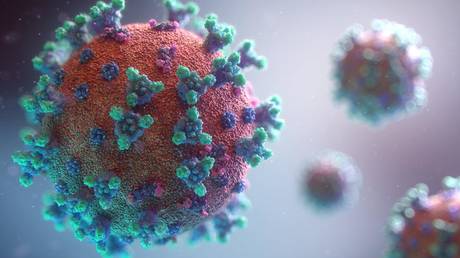‘Omicron’: How fear of new Covid strain gripped the world
New Covid ‘variant of concern’
The World Health Organization (WHO) convened an emergency meeting on Friday to discuss the viral strain, which had previously been known as B.1.1.529, declaring it a “variant of concern”while giving it the new name of “Omicron.”
“Preliminary evidence suggests an increased risk of reinfection with this variant, as compared to other strains,” the agency concluded. While little is yet known about Omicron, the WHO’s chief scientist Soumya Swaminathan noted that it carried “a number of worrying mutations” that could make the strain more infectious than any observed before.

... with dozens of ‘worrying mutations’
The large number of mutations have also prompted fears that Omicron could be resistant to existing vaccines and therapeutics, especially as currently available immunizations have been seen to lose effectiveness over time against other known variants of concern.
One major determining factor in the transmissibility of the virus is the evolution of its “spike proteins” – microscopic protrusions that allow the coronavirus to access and hijack host cells, causing infection. A strain detected in South Africa in May 2020 and dubbed ‘Beta,’ for example, had three significant mutations in its spike region, which helped make it between 20 and 30% more infectious. Omicron, on the other hand, is thought to have at least 32 spike mutations . . ."
‘Super mutant’ Covid strain found in Asia, Middle East
Variant B.1.1.529, which is yet to be given a name from the Greek alphabet like previous strains have, has spread rapidly across southern Africa since it was first identified in Botswana in early November. The strain, which is known to have multiple mutations of concern, already accounts for 90% of Covid-19 cases in the South African province of Gauteng – the highveld state home to major cities Pretoria and Johannesburg.
The spread of the variant across southern Africa has prompted a number of nations, including the UK and Israel, as well as countries in the European bloc, to declare flight bans from affected nations. The UK has banned flights from South Africa, Namibia, Botswana, Zimbabwe, Lesotho and Eswatini.
On Friday, the Israeli health ministry announced that the highly mutated variant had been detected in the country. The infection was identified in an Israeli who had returned from Malawi. The ministry said it was monitoring two other people suspected of being infected.
Meanwhile, two cases have been confirmed in the Asian financial hub of Hong Kong. Genome sequencing results from a Covid-19 patient who arrived in the city from South Africa confirmed on Thursday that the infection was the new variant from southern Africa.
The patient was also accused of wearing a “selfish” valve-style face mask which allowed the infection to pass to another guest at the quarantine hotel last week. Both individuals had been fully vaccinated.
The World Health Organization has admitted that little is known about the variant, with fewer than 100 full genomic sequences available for review. Experts have noted “a large number of mutations,” raising fears about the impact on diagnostics, therapeutics and vaccinations.



No comments:
Post a Comment